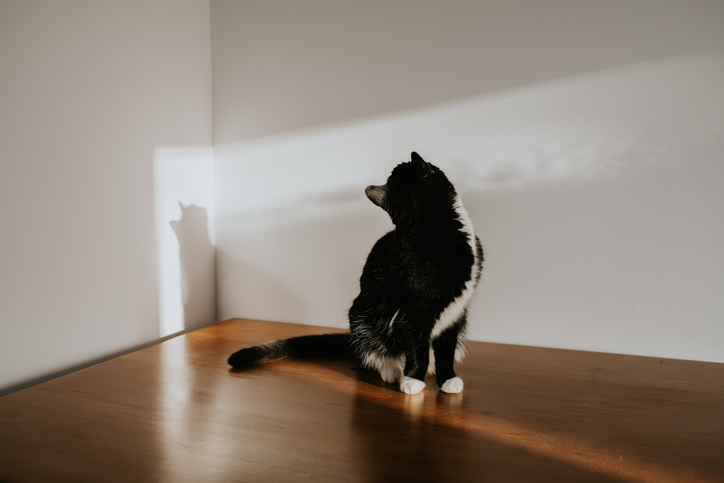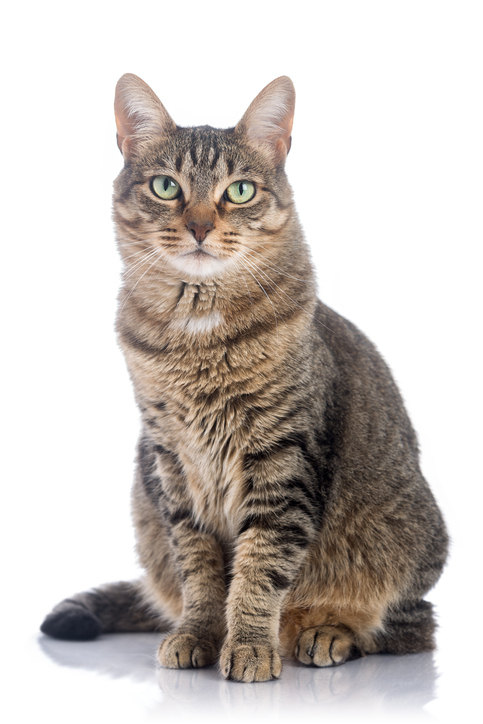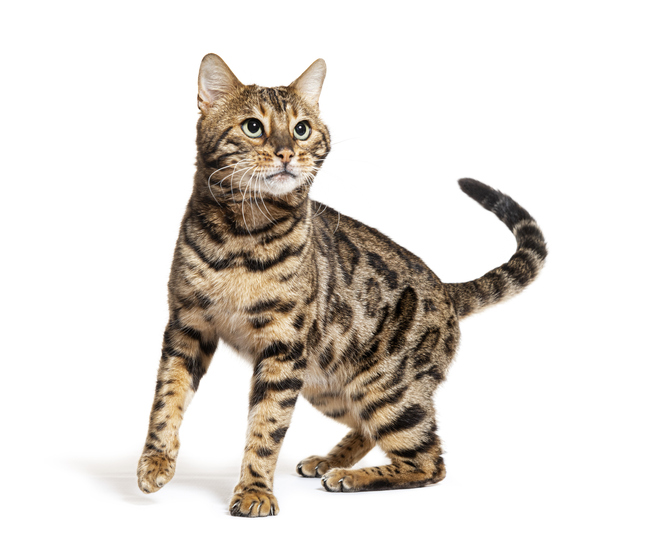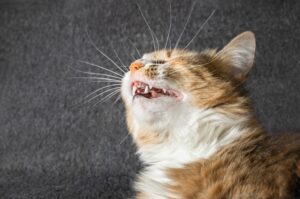Cats are fantastic to watch; they have little quirks and unique characteristics. For example, have you ever seen your cat staring at the wall and wondered what they are looking at or if this behavior was even normal?
It can be normal for a feline to stare at walls as long as it is not accompanied by any other concerning symptoms. Your cat could see or hear something you cannot, or they may just be curious. If your cat is older, they may be experiencing cognitive decline, which can be normal as they age.
If your cat is walking around in circles, meowing excessively, urinating outside of their litterbox, as well as staring at the walls, it may be time to see the vet. Read on to find out when it is normal for cats to stare at walls.

Why Do Cats Stare at Walls?
For the most part, when a cat stares at a wall, it is nothing to worry about. After all, cats can be weird and unpredictable, but they are always loveable. However, there are times when it may be a medical issue that requires attention and treatment. The following explains some of the reasons why cats stare at walls:
1) They Hear Something You Cannot
Cats have impressive hearing abilities and possess one of the best hearing ranges among mammals. The hearing range of the feline goes from 48 Hz to 85 kHz, which means they have keen hearing, making them excellent hunters.
For example, they can easily hear a tiny mouse rummaging through the cupboard for crumbs or quietly squeaking. A cat may stare at the wall where the cupboard is, preparing for a sneak attack. Felines can hear the slightest noises and movements produced by the tiny critter. The sounds could also be coming from the other side of the wall, as cats can hear many sounds that humans cannot. Your cat could be staring at the wall, trying to figure out what they are hearing and where the noise is coming from.
2) They Can See Something You Cannot
Cats have amazing vision and can see things humans cannot. While they do not have the same amount of cones we do, they have six to eight times more rods, which means they have impeccable night vision. They also have a wider field of vision that can span 200 degrees. A human’s field of vision only spans 180 degrees. Your cat has laser focus and can even see the sun reflecting off a dust particle.
Cats can also see little bugs and will place all their attention on a tiny spot on the wall for excessive time. They are especially enthralled when it moves, as it can drive a cat crazy when the spot starts to travel. Cats are like toddlers, who tend to be fascinated by almost anything.
3) Feline Cognitive Dysfunction
Feline cognitive decline can be common in older cats who may be confused and anxious. A cat with this condition may gaze at the wall for no apparent reason. It tends to occur due to age-related changes in the feline’s brain. Cognitive dysfunction can cause a cat to exhibit some bizarre behavior:
- Altered cycles of sleep and wakefulness
- Eliminating outside the litterbox
- Excessive or loud vocalizations
- Walking around in circles
- Decreased desire to play
- Aggressive grooming
- Decreased appetite
- Less responsiveness
A cat with cognitive decline may also be restless or irritated. Sometimes their social behavior changes, and they can become disinterested in petting and interaction. In some cases, they may become more clingy. If you see any of this behavior in your cat, especially older ones, get them to the vet as soon as possible.
4) They Are Curious Creatures

You know about cats and curiosity, right? Well, if you do not know, cats are curious creatures. One minute they are in your lap, purring contentedly and happy to be there; the next, they run off to investigate something. Cats can even notice the slightest change to the room; they know when you have moved something, or a piece of furniture is missing. Cats pay attention to little details.
5) They Are Supernatural
Okay, this may be a stretch, but some people believe that cats can sense the presence of ghosts and spirits. Cats can spot changes in light that humans cannot. They have heightened senses and can see and hear more than we can. Some people even think that cats can sense when a person is sick.
Cats have innate abilities we do not yet fully understand. Staring blankly at something we cannot see may be a sign that they communicate with an unknown presence, as many cat parents believe that their furry felines are the key to unlocking the spirit world. While there is no proof, it is a fun little theory to consider.
6) Feline Hyperesthesia Syndrome
Feline hyperesthesia syndrome is when a cat is sensitive in an area of their skin. It usually occurs on the back. Some veterinarians believe it is related to obsessive-compulsive disorder. Even though much research has been conducted to study this condition, veterinarians cannot pinpoint the actual cause of the affliction in cats. Some of the symptoms of feline hyperesthesia syndrome:
- Enlarged pupils
- Excessive grooming
- Skin biting or tearing
- Excessive or loud vocalization
Dr. Alexander de Lehunta, a Cornell University College of Veterinary Medicine professor, thinks it may be associated with a seizure-type issue. If hyperesthesia is correlated with a neurological disorder, the cat’s risk of physical injury can increase because the part of the brain responsible for reacting to stimuli is impaired.
Some other people in the veterinary field think it is linked to anxiety, as a cat may stare at the wall and meow incessantly. If you see any of these indicators in your cat, you should take them to the vet for examination.
6) They May Be Pondering What to Do Next
A cat staring at the wall may take a short break from their current activity to stop and ponder what they will do next. Cats are different from us in that they sometimes need to pause in the middle of an action to plan their next move and are known to freeze when they are in the midst of figuring something out. It is funny to watch cats sometimes.
Is Your Cat Pressing Their Head Against The Wall?
Head pressing is no joke. It arises from serious health conditions, such as a brain tumor, an infectious disease, a metabolic disorder, or a response to being exposed to a toxin. However, simply staring at the wall is only a concern if your cat is also pressing their head against the wall and not moving for a long time. Fortunately, head pressing is not a common occurrence in cats.
It must be noted that head pressing is not the same as head butting, which is your cat’s adorable way of marking you to let other members of the feline persuasion know to steer clear because you belong solely to them. When a cat head butts, they rub their scent against an object or person to mark them. It is simply their way of marking their territory without urine.
Conclusion
If you see your cat staring at the wall, it is probably not a cause for concern. However, if your cat’s behavior coincides with any of the symptoms mentioned in this article, you should take them to the vet to be on the safe side.
Do you have any further questions regarding your cat staring at the wall? Loveland Regional Animal Hospital in Loveland, OH is here to help! Give us call at (513) 697-9796 or make an appointment online today!





